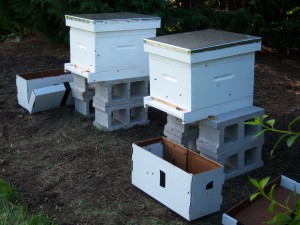The Honeybees have arrived!
I have always been curious about honeybees, and now that I have some space, I thought it might be a good time to try beekeeping. Last fall, I read somewhere that there was going to be a three Saturday class on beekeeping given by the Frederick County Beekeeping Association (FCBA). A friend and I decided to take the course which was held in January. It was great fun.
There is so much to learn about keeping bees. I remember thinking after the first class that I felt confident and was ready to get some bees and get started. After the second class, I came home feeling a bit overwhelmed and wondering if I was getting in over my head. By the third and final class, I once again felt more informed and encouraged and excited.
I ordered my bees from a local beekeeper, but knew that they weren’t going to be ready until the middle of May. It was a long time to wait, but they finally were ready for pick up. I drove to Bill’s house and loaded the two ‘nucleus hives’ (a fully operating, half size hive) into the back of my car. I was really hoping that the boxes were sealed pretty well, because I didn’t want to deal with a car full of angry escapees. We made it back home without incident.
I let the bees be still for a half hour, then ‘installed’ them into my two hives. The hive boxes hold 10 frames and the nucs have only five frames, so it wasn’t too crowded lowering the frames into the hives. I installed the five nuc frames first, then dropped in the five virgin frames.
The frames hold what is called foundation – mine is pure beeswax – which the bees use to build out the comb that they use to both raise their young (brood) as well as store honey. There weren’t as many bees in the nucs as I thought there would be, but new bees will be emerging from the brood on a daily basis and the numbers should climb quickly.
Bees spend the first half of their lives inside the hive, tending to the larva, attending to the queen, building comb, concentrating the nectar into honey, etc. They only leave the hive to forage for nectar and pollen during the second half of their short lives. Bees only live one to two months.
So I am hoping that my hives are busy on the inside, temporarily using up some of the stored honey while creating more comb on the new foundation which gives the queen more places to lay her eggs.
The bees have just been moved out of familiar territory and will need some time to acclimate themselves to their new surroundings, so I need to be patient and not worry. Maybe I should cut down on my visits to ‘check the hives’ from 10 times a day to about once or twice. It’s been a (large) number of years since I have been responsible for a human baby, so I guess I can obcess over my bees just a little.
Meanwhile, my friend got his bees in a different type of package, but almost eight weeks ago, and his bees are doing great. He probably has 40,000 to 50,000 bees in each of his hives. They seem to be thriving. Mine were just installed, but I already am worried that they might not get strong enough to make it through the coming winter. I know it’s too early to be worried but I am anyway.
